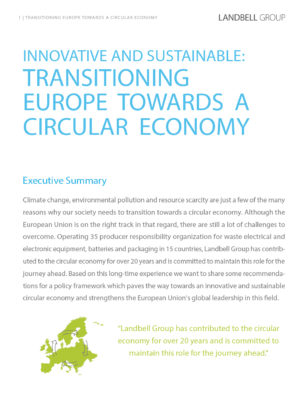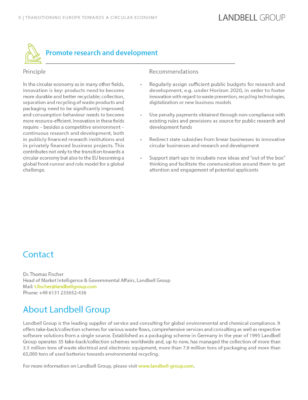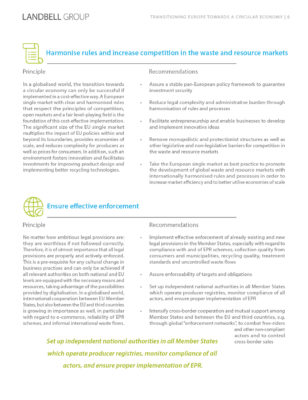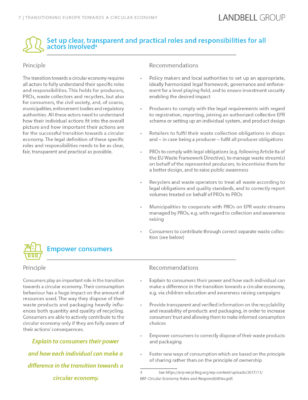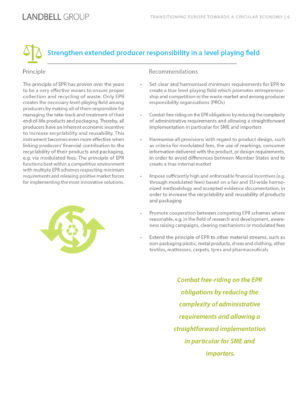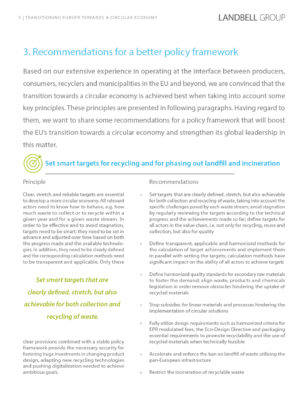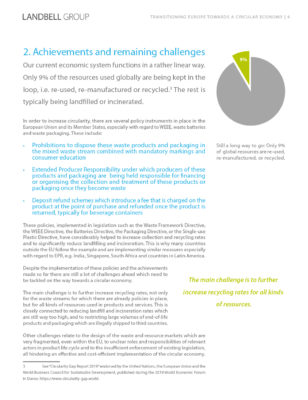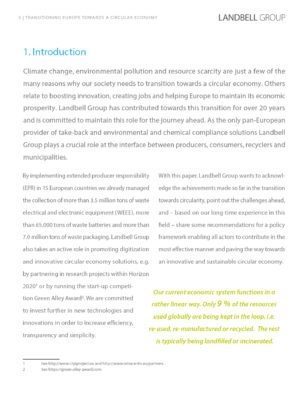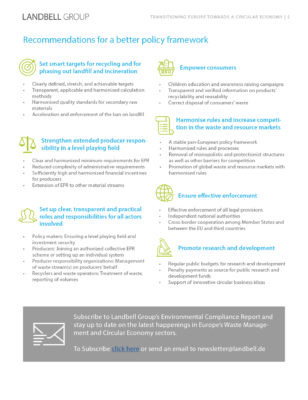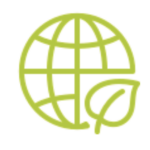TRANSITIONING EUROPE
TOWARDS A CIRCULAR
ECONOMY
AN INNOVATIVE AND SUSTAINABLE APPROACH
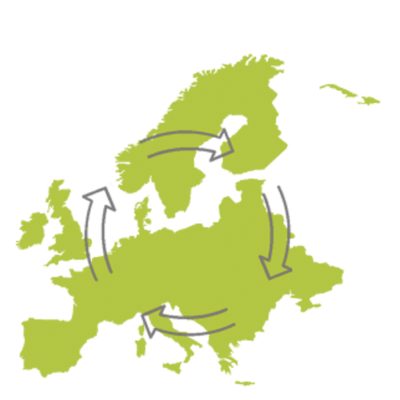
Climate change, environmental pollution, and resource scarcity are just a few of the many reasons why our society needs to transition towards a circular economy. Although the European Union is on the right track in this regard, there are still a lot of challenges to overcome.
Operating 35 producer responsibility organisations for waste electrical and electronic equipment, batteries and packaging across 15 countries, Landbell Group has contributed to the circular economy for over 20 years and is committed to continuing this role in the future.
Based on this long-term experience, we want to share some recommenda- tions for a policy framework which paves the way for an innovative and sustainable circular economy, and also strengthens the European Union’s global leadership in this field.
"Our current economic system functions in a rather linear way. Only 9% of the resources used globally are kept in the loop, i.e. re-used, re-manufactured or recycled. The rest is typically landfilled or incinerated."
"The main challenge is to further increase recycling rates for all kinds of resources."
"Landbell Group has contributed to the circular economy for over 20 years and is committed to maintaining this role on the journey ahead."
-
0%
ACHIEVEMENTS AND
REMAINING CHALLENGES
Despite the achievements made so far, there are still a lot of challenges ahead which need to be tackled to drive the transition towards a circular economy.
- Increasing recycling rates, not only for the waste streams for which there are already policies in place, but for all kinds of resources used in products and services.
- Reducing landfill and incineration rates.
- Restricting large volumes of end-of-life products and packaging which are illegally shipped to third countries.
- Redesigning the waste and resource markets which are very fragmented, even within the EU. The redesigned system would ensure all stakeholders had clear roles and responsibilities across the product life cycle, with sufficient enforcement of existing legislation.
RECOMMENDATIONS FOR A BETTER
CIRCULAR ECONOMY FRAMEWORK
Based on our extensive experience operating at the interface between producers, consumers, recyclers and municipalities, in the EU and beyond, we are convinced that the transition towards a circular economy must be driven by a few key principles. These principles are presented below. Within this context, we want to share some recommendations for a policy framework that will boost the EU’s transition towards a circular economy and strengthen its global leadership in this domain.
Seven Steps towards a better circular economy
1. SET SMART TARGETS FOR RECYCLING AND PHASING OUT LANDFILL AND INCINERATION
- Clearly defined, ambitious and achievable targets
- Transparent, appropriate and consistent calculation methods
- Uniform quality standards for secondary raw materials
- Acceleration and enforcement of the ban on landfill
2. CREATE A LEVEL PLAYING FIELD TO STRENGTHEN PRODUCER RESPONSIBILITY
- Clear and standardised minimum requirements for extended producer responsibility (EPR)
- Reduced complexity of administrative requirements
- Sufficiently high and stable financial incentives for producers
- Extension of EPR to other material streams
3. SET UP CLEAR AND PRACTICAL ROLES AND RESPONSIBILITIES FOR ALL ACTORS INVOLVED
- Policymakers: Ensure a level playing field and investment security
- Producers: Join an authorized collective EPR scheme or set up an individual system
- Producer responsibility organisations: Manage waste stream(s) on producers’ behalf
- Recyclers and waste operators: Treat resources and waste, and report volumes
4. EMPOWER CONSUMERS
- Children's education and awareness raising campaigns
- Transparent and verified information on products’ recyclability and reusability
- Correct disposal of consumers’ waste
5. STANDARDISE RULES AND INCREASE COMPETITION IN THE WASTE AND RESOURCE MARKETS
- A stable pan-European policy framework
- Consistent rules and processes
- Elimination of monopolistic and protectionist structures as well as other barriers to competition
- Promotion of global waste and resource markets with standardised rules
6. ENSURE EFFECTIVE ENFORCEMENT
- Effective enforcement of all legal provisions
- Independent national authorities
- Cross-border cooperation among Member States and between the EU and third countries
7. PROMOTE RESEARCH AND DEVELOPMENT
- Regular public budgets for research and development
- Penalty payments as source for public research and development funds
- Support for innovative circular business ideas
ABOUT LANDBELL GROUP
As the only pan-European provider of take-back and environmental and chemical compliance services, Landbell Group plays a crucial role at the interface between producers, consumers, recyclers and municipalities.
By operating 35 producer responsibility organisations in 15 European countries, we have already directly managed the collection of more than 3.5 million tonnes of waste electrical and electronic equipment (WEEE), more than 65,000 tonnes of waste batteries and more than seven million tonnes of waste packaging. Landbell Group also takes an active role promoting digitisation and innovative circular economy solutions, by acting as a partner on Horizon 2020 research projects or running the start-up competition, the Green Alley Award.
With this paper, Landbell Group wants to acknowledge the achievements made so far in the transition towards circularity, point out the challenges ahead and, based on our long-time experience in this field, share some recommendations for a policy framework that will enable all actors to contribute to an innovative and sustainable circular economy in the most effective manner.

CONTACT
Dr. Thomas Fischer
Head of Market Intelligence & Governmental Affairs, Landbell Group

